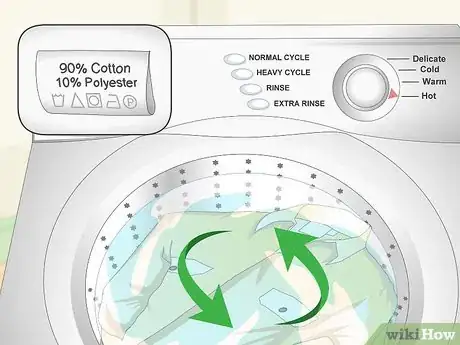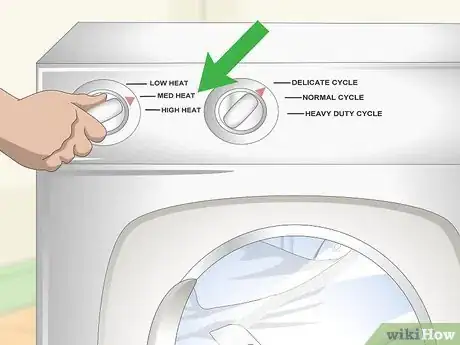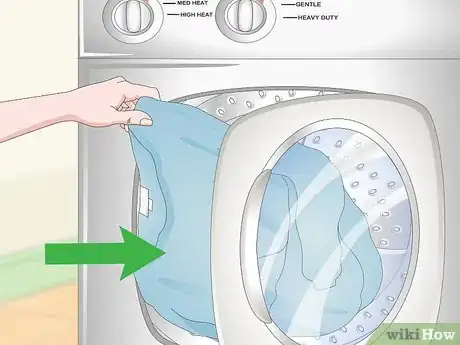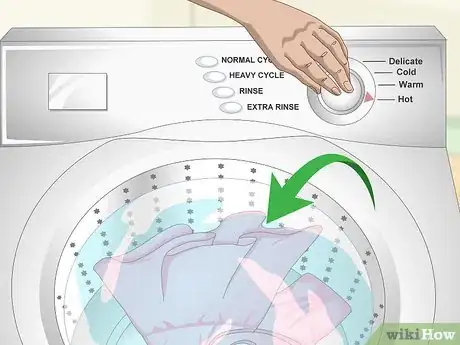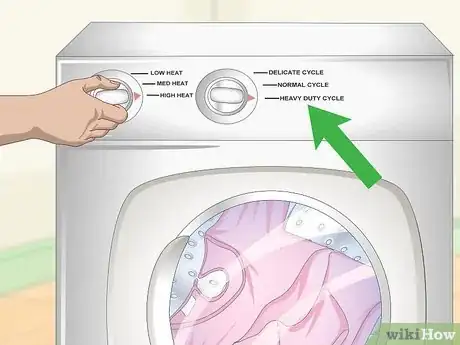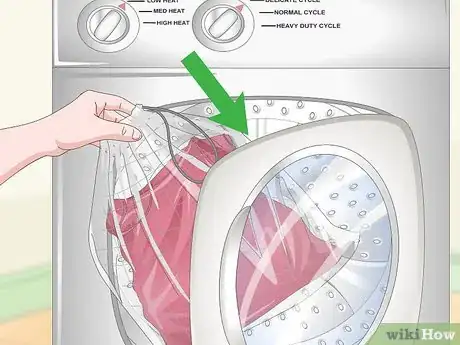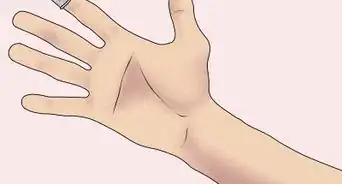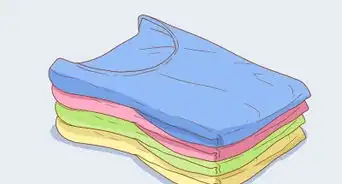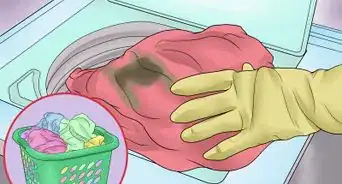This article was co-authored by Susan Stocker. Susan Stocker runs and owns Susan’s Green Cleaning, the #1 Green Cleaning Company in Seattle. She is well known in the region for outstanding customer service protocols — winning the 2017 Better Business Torch Award for Ethics & Integrity —and her energetic support of green cleaning practices.
There are 13 references cited in this article, which can be found at the bottom of the page.
This article has been viewed 60,348 times.
Shrinking clothing in the dryer is generally regarded as a common laundry mistake. However, there are certain occasions where it may be helpful to intentionally shrink a garment. If you’ve lost weight, or if you accidentally bought a shirt that’s a size too big, you can shrink your clothes in the dryer without turning them child-size. Depending on what fabric your clothes are made of, there are multiple ways to decrease their size using a dryer. In some cases, putting them in for one cycle is all it takes!
Steps
Cotton and Blended Fabric
-
1Read the label to find out what kind of cotton you’re working with. If your cotton garment or fabric has a label, check it before washing or drying. Different varieties of cotton-based material require different shrinking approaches, and confirming what kind you have will inform which one you choose.[1]
- If the label states that the garment is pre-shrunk cotton, don’t bother trying to shrink it. It has already been shrunk, and it won’t shrink again.
-
2Put 100% cotton products directly into the dryer. Especially when it comes to delicate cotton fabrics, washing them for the express purpose of shrinkage puts them at risk of pilling and permanent damage. Simply putting them in the dryer is the safest way to shrink pure cotton.[2]
- Contrary to popular belief, high temperatures are not the primary cause of cotton shrinkage. Instead, shrinking results from agitation, or the vigorous motion of the drying cycle.[3] This means that you can dry a cotton garment on high or medium heat and end up with similar results.
Advertisement -
3Machine-wash blended cotton fabric before drying. If your fabric includes a small percentage of artificial fiber in addition to pure cotton-like polyester or polyurethane – you will need to use heat and moisture in addition to agitation. Use a gentle laundry detergent and hot water.[4]
- Jeans and other denim garments are often made with blended cotton, especially if they’re stretchy.
-
4Use a short cycle and high or medium heat for pure cotton clothes. If you want your 100% cotton garment to shrink between one size and one-half of a size, use a gentle setting (low agitation) and check it halfway through the cycle to see if it has already shrunk to the desired size. To shrink your garment more dramatically, use a high-agitation setting and allow it to dry for the entirety of the short cycle. Repeat if the garment did not shrink enough.[5]
-
5Dry blended cotton garments for the entirety of a normal-length cycle. If your garment did not shrink to the desired size on the first wash and dry cycle, repeat the process. Shrinking in blended fabrics often takes place gradually, not all at once.[6]
- The higher the percentage of fibers besides cotton, the more times you will need to wash and dry your garment to get it to shrink. One exception to this rule is rayon – because it is made from natural fibers, it tends to shrink. It’s safest to put cotton-rayon blends directly in the dryer if you’re trying to shrink them.[7]
Wool Fabric
-
1Spritz your wool garment with water. Using lukewarm water in a clean spray bottle, spray water on the surface of your wool garment so it’s damp, but not wet.[8]
- Take care to use lukewarm water instead of hot water. Wool can be even more sensitive than cotton, and using hot water before drying it will encourage its fibers to clump together, causing the garment to shrink excessively.[9]
- For similar reasons, make sure your wool garment is damp, but not wet. Putting a soaked wool garment directly the dryer will cause extreme shrinkage.
-
2Put the dampened wool garment in the dryer. Use a short, gentle cycle and low heat, because both agitation and high temperatures can cause wool to shrink rapidly. Drying the wool for a short period of time at a low heat will prevent this from happening.[10]
-
3Check on your garment every few minutes. Assess your garment's shrinkage progress by stopping the drying cycle and pulling it out every 2-3 minutes. You may find that your wool garment is shrinking more quickly than you expected. If so, you’ll want to pull it out before the cycle is over.[11]
- Avoid hanging your wool garment after shrinking it in the dryer. This may cause it to stretch out again.[12]
Polyester and Other Synthetic Fabrics
-
1Ensure that your polyester fabric is durable and high-quality. Plenty of heat is required to shrink these fabrics, but if they’re not well-made, high temperatures can cause them to look old and worn-out. Don’t attempt to shrink a polyester garment unless you’re confident in its quality.[13]
-
2Wash polyester and similar synthetic fabrics on high heat before drying. Select the longest possible washing cycle and the maximum washer temperature, then place your garment in the washing machine and start it.[16]
- This extended exposure to high temperatures will weaken the polymers that make up these artificial fibers, making them more malleable and vulnerable to shrinkage.
- Make sure that your washer’s maximum water temperature is less than 178 °F (81 °C). Any temperature higher than this will cause the fabric to become stiff, rough, and shapeless.
-
3Dry polyester after washing using high heat and a long cycle. When the wash cycle ends, wait until the fabric reaches a temperature that is safe to handle. Then, as quickly as possible, transfer it to the dryer. Use a long, high-heat cycle to shrink.[17]
- Polyester can be a stubborn fabric to shrink, so you may need to repeat these steps one or two more times before you notice any significant changes. If it stays the same size, it’s possible that you won’t be able to shrink it at all.
Silk Fabrics
-
1Wet a small patch of the silk garment and rub it to test for color-fastness and quality. Sometimes, dyed silks can bleed, especially on the first or second wash. If any dye rubs off onto your finger during this test, wash the garment on its own to prevent staining other pieces of clothing.[18]
- Even if the silk seems to be color-fast, it's usually safest to wash it with like-colored clothing.
-
2Place your silk garment in a mesh bag. Silk is far more delicate than polyester, so precautions, such as placing it in a mesh garment bag, must be taken to ensure that it is not damaged or excessively shrunk in the washing machine or dryer.[19]
-
3Wash the bagged silk garment in your washing machine. Place the garment bag containing your piece of silk clothing in the washing machine, then add a detergent that is specifically designed for washing wool, silk, or other delicate fabrics. Use warm (but not hot) water, a short cycle, and a gentle wash setting.[20]
-
4Transfer the garment bag to your dryer. Dry using low heat and a gentle, short cycle. Pause the cycle and remove the garment bag periodically (once every 4-5 minutes) to check whether your garment has shrunk to the desired size.[23]
Expert Q&A
Did you know you can get expert answers for this article?
Unlock expert answers by supporting wikiHow
-
QuestionWill putting dry clothes in the dryer shrink them?
 Susan StockerSusan Stocker runs and owns Susan’s Green Cleaning, the #1 Green Cleaning Company in Seattle. She is well known in the region for outstanding customer service protocols — winning the 2017 Better Business Torch Award for Ethics & Integrity —and her energetic support of green cleaning practices.
Susan StockerSusan Stocker runs and owns Susan’s Green Cleaning, the #1 Green Cleaning Company in Seattle. She is well known in the region for outstanding customer service protocols — winning the 2017 Better Business Torch Award for Ethics & Integrity —and her energetic support of green cleaning practices.
Green Cleaning Expert It really depends on the material and whether it has been washed and dried before. Cotton will shrink roughly 20% if you throw it in the dryer and it's brand new. Wool can shrink dramatically, while synthetic fibers may not experience much shrinkage. After a garment has been washed a few times though, you aren't going to see nearly as much shrinking.
It really depends on the material and whether it has been washed and dried before. Cotton will shrink roughly 20% if you throw it in the dryer and it's brand new. Wool can shrink dramatically, while synthetic fibers may not experience much shrinkage. After a garment has been washed a few times though, you aren't going to see nearly as much shrinking.
References
- ↑ https://sewguide.com/how-to-shrink-clothes/
- ↑ https://www.today.com/style/how-shrink-clothes-shrink-cotton-jeans-polyester-more-t144393
- ↑ https://www.today.com/style/how-shrink-clothes-shrink-cotton-jeans-polyester-more-t144393
- ↑ https://mamabee.com/how-to-shrink-clothes/
- ↑ https://propercloth.com/reference/dress-shirt-shrink/
- ↑ https://propercloth.com/reference/dress-shirt-shrink/
- ↑ https://www.nytimes.com/1991/06/08/news/new-rayon-clothing-ruffles-some-wearers.html
- ↑ https://lifehacker.com/shrink-a-wool-sweater-and-make-it-fit-again-1579046599
- ↑ Susan Stocker. Cleaning Professional. Expert Interview. 8 November 2019.
- ↑ http://mentalfloss.com/article/21316/why-do-clothes-shrink-wash
- ↑ Susan Stocker. Cleaning Professional. Expert Interview. 8 November 2019.
- ↑ http://sewguide.com/what-is-wool-care/
- ↑ https://mamabee.com/how-to-shrink-clothes/
- ↑ https://www.contrado.co.uk/blog/what-is-polyester-a-closer-look-into-this-love-it-or-hate-it-fabric/
- ↑ https://www.sewingpartsonline.com/blog/411-cotton-vs-polyester-pros-cons/
- ↑ https://homequicks.com/how-to-shrink-polyester
- ↑ https://homequicks.com/how-to-shrink-polyester
- ↑ https://www.loveyourclothes.org.uk/tips/how-wash-silk
- ↑ https://www.loveyourclothes.org.uk/tips/how-wash-silk
- ↑ https://mamabee.com/how-to-shrink-clothes/
- ↑ https://www.loveyourclothes.org.uk/tips/how-wash-silk
- ↑ https://mamabee.com/how-to-shrink-clothes/
- ↑ https://mamabee.com/how-to-shrink-clothes/


